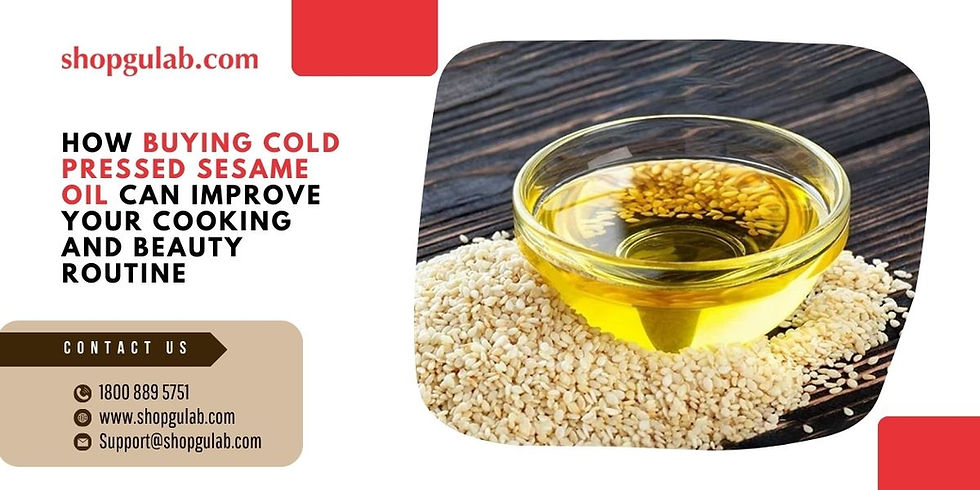Ghani Oil vs. Refined Oil: Which Is Better for Your Health
- Oct 20, 2023
- 4 min read
1. Introduction
In the world of culinary oils, two contenders have been gaining considerable attention: Ghani Oil and Refined Oil. But which one should you choose for a healthier lifestyle? This article aims to shed light on the essential differences between these oils and help you make an informed decision regarding your health and cooking choices.
2. Understanding Ghani Oil
Ghani oil, also known as cold-pressed oil, is an age-old method of oil extraction. It involves the use of traditional wooden or stone presses, which are operated manually. This process does not involve the application of heat, ensuring that the oil retains its natural flavor and nutrients.
3. Understanding Refined Oil
Refined oil, on the other hand, undergoes a more intensive process. It is extracted using mechanical or chemical methods, often involving high temperatures. This process removes impurities but can also strip the oil of some of its natural characteristics.

4. Nutritional Comparison
When it comes to nutritional value, Ghani oil has the upper hand. The cold-pressing method used in its production ensures that it retains a higher concentration of essential nutrients. It's rich in vitamins such as vitamin E, which is known for its antioxidant properties, as well as vitamin K. These vitamins play a vital role in maintaining healthy skin, supporting the immune system, and aiding blood clotting.
On the other hand, refined oils might lose some of these vital nutrients during their processing. The refining process involves bleaching and deodorizing, which can strip the oil of some of its natural goodness. While refined oils are still a source of healthy fats, they may not offer the same nutritional benefits as their Ghani counterparts.
5. Health Benefits of Ghani Oil
Ghani oil is lauded for its health benefits. With its preservation of nutrients and antioxidants, it can boost your immune system, improve heart health, and aid in digestion. It's an excellent source of good fats that your body needs.
6. Health Benefits of Refined Oil
Refined oil, thanks to its purity, offers benefits such as a high smoke point, making it ideal for deep-frying. However, it might not provide the same level of nutrients that Ghani oil does.
7. The Cooking Factor
Your choice of oil plays a significant role in the outcome of your culinary creations. Ghani oil's distinct flavor adds depth to your dishes, making it a fantastic choice for salad dressings, marinades, and light sautéing. Its flavor complements a wide range of recipes, particularly those that benefit from a nutty and earthy undertone.
In contrast, refined oils are known for their neutral taste. This neutrality makes them versatile and adaptable to various cuisines. They serve as a canvas for other flavors to shine, making them ideal for recipes where you want the primary ingredients to take center stage. Refined oils are often used for baking, frying, and cooking methods that require a clean, non-intrusive taste.
8. Flavor and Aroma
Ghani oil brings an authentic, nutty flavor to your dishes, enhancing the overall culinary experience. Refined oil might not contribute to the flavor as much, making it a preferred choice when you want the other ingredients to shine.
9. Processing Methods
Ghani oil's traditional and manual extraction method ensures minimal processing, making it a choice for those who prefer minimally processed foods. Refined oil, though purified, undergoes extensive processing, which might concern some consumers.
10. Smoke Point
The smoke point of an oil is crucial when it comes to high-temperature cooking. Ghani oil has a lower smoke point, making it less suitable for deep frying. Refined oil, with its higher smoke point, is a better option for such cooking methods.
11. Price Considerations
Ghani oil is often perceived as more expensive due to its traditional production methods and the limited scale of production. Refined oil, manufactured on a larger scale, is usually more cost-effective. Refined oils, on the other hand, undergo a more complex and intensive process. Mechanical or chemical methods are used to extract the oil, and this often involves high temperatures. While this process removes impurities, it can also strip the oil of some of its natural characteristics. Additionally, refined oils may undergo deodorizing and bleaching processes to achieve a neutral flavor profile.
12. Sustainability and Environmental Impact
Another vital aspect is the environmental impact. Ghani oil production tends to be more sustainable and eco-friendly, with minimal waste. In contrast, refined oil manufacturing may have a higher environmental footprint due to the energy-intensive processes involved.
In contrast, refined oil manufacturing may have a higher environmental footprint due to the energy-intensive processes involved in refining and large-scale production. Refined oils often require significant resources, which can contribute to environmental degradation. It's essential to weigh the sustainability factors when making your choice.

13. Conclusion
In the debate of Ghani Oil vs. Refined Oil, the choice ultimately comes down to your preferences and specific culinary needs. Ghani oil preserves more nutrients and offers a distinct flavor, while refined oil provides versatility and a higher smoke point. Consider your cooking style, dietary requirements, and environmental concerns when making your decision.
To find more information about our products contact us now!!!








Comments